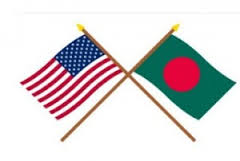The US ambassador in Dhaka Dan Mozena on Friday said his country’s GSP decision would serve as ‘the first step’ in ensuring that Bangladesh never again has another devastated Rana plaza incident or Tazreen factory fire.“It was not cancellation, it’s suspension,” he said calling for actions to regain the facility.
US Ambassador Dan W Mozena speaks at a discussion at the National Press Club on Tuesday. Photo: bdnews24.com/ Dhaka, July 09, 2012
The envoy was talking to journalists on the sidelines of a function in Dhaka.
The US has suspended long-time preferential trade benefits, or GSP status, for Bangladesh in a mostly symbolic response to hazardous working conditions in the garment industry that have cost more than 1,200 lives in the past year.
The US sanction does not directly affect Bangladesh’s main export, multi-billion-dollar clothing to the United States, since garment is not eligible for duty cuts under the Generalized System of Preference, or GSP facility.
But the decision raised concerns as other countries like European Union and Canada, where Bangladesh’s main export item readymade garments enjoy this facility, might follow the suit.
The government was upset over the ‘unfortunate’ decision as it said it had taken concrete and visible measures to improve factory safety and protect workers’ rights and hoped Washington would soon reintroduce the facility.
However, the government smelt a rat over the involvement of a section of people in Bangladesh and the US for the decision.
“Indeed a section of people, both within Bangladesh and the USA, had long been campaigning for this,” the Ministry of Foreign Affairs said in a statement on Friday after the decision.
The government has amended the 2006 Labour Act, signed ILO-led government-employer-worker tripartite agreement to implement time-bound decisions, and formed a ministerial committee to ensure compliance in garment factories, steps that Bangladesh says should speak for the government’s ‘seriousness’ on the matter.
The US envoy said Bangladesh needed “to take the measures to ensure never again such incidents would recur…… and first step in that process, I think, could be the suspension of GSP privileges”.
He said as Bangladesh would work to regain the privilege, the decision would act as the first step that would “make sure labour rights are fully honoured, workers have the right to freely associate, workers have the rights to organise, all factories meet fire safety standards and factory buildings are structurally sound”.
He said some people trying to make it ‘big negative’. “This is the first step forward in making Bangladesh a preferred brand in the global market…towards making Bangladesh number one in exporting RMG, ahead of China.”
Bangladesh’s apparel came under scrutiny after the collapse of the Rana Plaza garment factory building in April that killed over 1,100 people and the Tazreen Fashions Ltd factory fire in November last year that killed more than 110.
Analysts however said the decision could influence the European Union to take similar action, which would have a much bigger impact on Bangladesh and its main export item ready-made garment.
The European Union buys more than $12 billion Bangladeshi garments each year, or roughly three-fifths of the country’s production.
Losing the GSP facility will cost Bangladesh millions of dollars in taxes.
Suspending Bangladesh from the GSP programme would increase US duties on an array of products the country exports to the United States, such as tobacco, sport equipment, porcelain china, plastic products and a small amount of textile products.
Quoting trade analyst with the GlobalWorks Foundation Ed Gresser, Reuters said, last year Bangladesh was spared about $2 million in US duties on about $35 million worth of goods under GSP programme, but it paid about $732 million in US duties on $4.9 billion of clothing exports not covered by the programme.
The GSP facility was created in 1976 to help economic development in the world’s poorest countries and to reduce import costs for US companies.
Bangladesh is among more than 125 countries that receive concession on United States tariffs under a World Trade Organisation programme intended to promote economic growth around the globe.
Bangladesh is allowed to duty-free export nearly 5,000 products to the United States, which purchases about 25 percent of the country’s $18 billion annual apparel exports.
The United States’ review dates back to 2007, when the AFL-CIO, the main US labour group, first filed a petition asking for revocation of trade benefits to Bangladesh. (Source: bdnews24.com)




